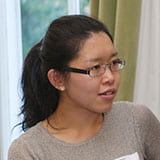SEED projects 2017 – Writing, Writing Everywhere
Improving critical thinking and written communication in physics with open-ended experiments and abbreviated argument-based reports
Dr Kathleen Foote and Anna Yang (Faculty of Science)
The Physics Department wants to produce graduates who can think critically, communicate effectively, work in teams, utilise creativity, and more. Since traditional lecture courses fail to teach these skills, we decided to switch our introductory courses to a highly interactive studio format to explicitly incorporate soft-skill development. We hoped the SEED grant would allow us to modify the lab report format to improve students’ scientific and argument-based writing.
In these new-format studio classes students worked in a reformed space that combined the laboratory, “lecture” and tutorial. Set up with round tables, and technology, and no “front” of class, the space discouraged the instructor from lecturing. Instead, students could work on activities as the instructor roamed around engaging teams in dialogue.
This SEED project was used to develop more open-ended lab activities and a revised report format that targeted student’s scientific writing abilities. We wanted to leverage video analysis to collect and analyse data. We wanted experiments that used simple, inexpensive and easy to store equipment. We removed the cookbook instructions and framed the experiments as “challenges” so students could build critical thinking skills as they designed and executed unique methodologies. The report was changed to a less structured, “extended abstract” format where students had one page to describe their experiment and construct a scientific argument to support their claims. We developed a detailed rubric to ensure our expectations were clear and to promote consistent and efficient marking. Students did a peer evaluation of the draft of each other’s reports for feedback before submitting the final. We also discussed the role of peer review in science as a whole.
Overall the project was a success. Students easily completed experiments despite the lack of structured instructions. They struggled more writing the reports. We had to refine the peer review, and, ultimately, had students grade their own report using the rubric and answer six questions that targeted common difficulties about their peer’s report.
The quality of reports rose and many students cited “writing lab reports” as one of the main skills they gained over the semester. The reports were all unique, with an almost negligible level of plagiarism so students engaged with a more creative outlet within the physics course.
We plan to make these labs a permanent part of the curriculum.
